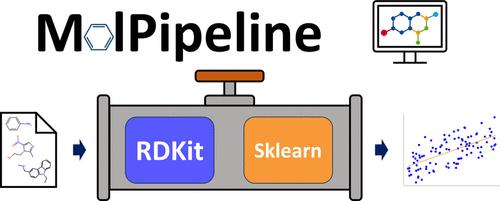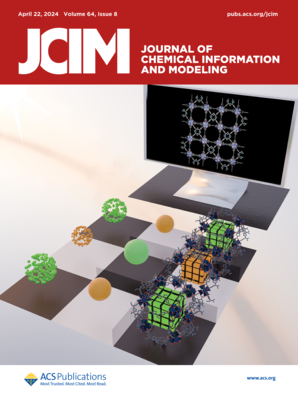MolPipeline:在 Scikit-learn 中使用 RDKit 处理分子的 Python 软件包
IF 5.3
2区 化学
Q1 CHEMISTRY, MEDICINAL
引用次数: 0
摘要
开源软件包 scikit-learn 提供了各种机器学习算法和数据处理工具,其中包括 Pipeline 类,它允许用户为机器学习模型预置自定义数据转换步骤。我们介绍的 MolPipeline 软件包通过封装标准 RDKit 功能(如读写 SMILES 字符串或从分子对象计算分子描述符),将这一概念扩展到了化学信息学领域。我们的目标是建立一个易于使用的 Python 软件包,以创建可扩展到大型数据集的完全自动化端到端管道。我们特别强调了错误实例的处理,在默认管道中,错误实例的解决需要人工干预。MolPipeline 提供了构建模块,可在 scikit-learn 的管道框架内无缝集成常见的化学信息学任务,如支架拆分和分子标准化,使管道构建轻松适应各种项目要求。本文章由计算机程序翻译,如有差异,请以英文原文为准。

MolPipeline: A Python Package for Processing Molecules with RDKit in Scikit-learn
The open-source package scikit-learn provides various machine learning algorithms and data processing tools, including the Pipeline class, which allows users to prepend custom data transformation steps to the machine learning model. We introduce the MolPipeline package, which extends this concept to cheminformatics by wrapping standard RDKit functionality, such as reading and writing SMILES strings or calculating molecular descriptors from a molecule object. We aimed to build an easy-to-use Python package to create completely automated end-to-end pipelines that scale to large data sets. Particular emphasis was put on handling erroneous instances, where resolution would require manual intervention in default pipelines. MolPipeline provides the building blocks to enable seamless integration of common cheminformatics tasks within scikit-learn’s pipeline framework, such as scaffold splits and molecular standardization, making pipeline building easily adaptable to diverse project requirements.
求助全文
通过发布文献求助,成功后即可免费获取论文全文。
去求助
来源期刊
CiteScore
9.80
自引率
10.70%
发文量
529
审稿时长
1.4 months
期刊介绍:
The Journal of Chemical Information and Modeling publishes papers reporting new methodology and/or important applications in the fields of chemical informatics and molecular modeling. Specific topics include the representation and computer-based searching of chemical databases, molecular modeling, computer-aided molecular design of new materials, catalysts, or ligands, development of new computational methods or efficient algorithms for chemical software, and biopharmaceutical chemistry including analyses of biological activity and other issues related to drug discovery.
Astute chemists, computer scientists, and information specialists look to this monthly’s insightful research studies, programming innovations, and software reviews to keep current with advances in this integral, multidisciplinary field.
As a subscriber you’ll stay abreast of database search systems, use of graph theory in chemical problems, substructure search systems, pattern recognition and clustering, analysis of chemical and physical data, molecular modeling, graphics and natural language interfaces, bibliometric and citation analysis, and synthesis design and reactions databases.

 求助内容:
求助内容: 应助结果提醒方式:
应助结果提醒方式:


